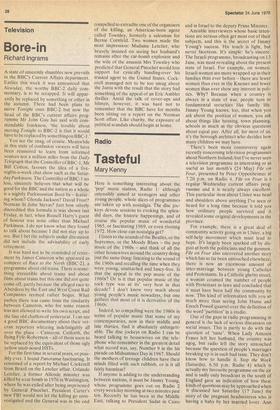Radio
Tasteful
Mary Kenny
Here is something interesting about the 'pop' music station, Radio 1: although ostensibly aimed at teenagers and other young people, whole slices of programmes are taken up with nostalgia. The disc jockeys devote sessions to evoking the splendid days, the historic happenings, and of course the popular music of wonderful 1965, or fascinating 1969, or even riveting 1972. How close can nostalgia get?
I listen to the sounds of the Beatles, or the Supremes, or the Moody Blues — the pop music .of the 1960s — and think of all the other housewives around the country doing just the same thing: listening to the sound of the 1960s and recalling the time when they were young, unattached and fancy-free. Is that the appeal in the pop music of the 1960s? Or is it that popular music of the rock type was at its' very best in that decade? I don't know very much about young people's music nowadays, but one gathers that most of it is derivative of the 1960s.
Indeed, so compelling were the 1960s in terms of popular music that some of my contemporaries, now in their middle and late thirties, find it absolutely unforgettable. The disc jockeys on Radio 1 can be heard talking to housewives on the telephone who remember in the greatest detail what record was, say, Number 9 in the hit parade on Midsummer Day in 1967. Should the mothers of teenage children have their minds filled with such rubbish, or is it all fairly harmless?
If anyone is adding to the understanding between nations, it must be Jimmy Young, whose programme goes out on Radio 2 every weekday morning at two minutes past ten. Recently he has been in the Middle East, talking to President Sadat in Cairo and in Israel to the deputy Prime Minister.
Amiable interviewers whose basic intentions are serious often get most out of their subjects, and this is the secret of Jimmy Young's success. His touch is light, but never facetious. It's simple: he's sincere. The Israeli programme, broadcasting on 13 June, was most revealing about the present state of Israel. For example, on women: Israeli women are more wrapped up in their families than ever before — there are fewer women than ever in the Knesset and fewer women than ever show any interest in politics. Why? Because when a country is always in a state of war, people turn to fundamental securities like family life. Jimmy Young knows, too, that when you ask about the position of women, you ask about things like housing, town planning, schools as much as the obvious questions about equal pay. After all, for most of us, it's the borough architect who decides how many children we may have.
There's been more controversy again recently concerning television programmes about Northern Ireland; but I've never seen a television programme as interesting or as useful as last month's (24 May) File on Four, presented by Peter Oppenheimer at 7.20 p.m. on Radio 4. File on Four is a regular Wednesday current affairs programme and it is nearly always excellent. This particular item about Ulster was head and shoulders above anything I've seen or heard for a long time because it told you how ordinary people survived and it revealed some original developments in the province.
For example, there is a great deal of community activity going on in Ulster, a big self-help movement which must lead to hope. It's largely been sparked off by disgust at both the politicians and the gunmen. File on Four also uncovered another story which has so far been untouched elsewhere; there is now an enormous amount of inter-marriage between young Catholics and Protestants. In a Catholic ghetto street, a woman counted the number of people with Protestant in-laws and concluded that it must have been half the community by now. This kind of information tells you so much more than seeing John Hume and Enoch Powell quarrel over the definition of the word `purtition' in a studio.
One of the gaps in radio programming in general is the lack of serious discussion on social issues. This is partly to do with the question of 'taste'. When Lady Antonia . Fraser left her husband, the country was agog, but radio left the story untouched because the question of people's marriages breaking up is in such bad taste. They don't know how to handle it. Stop the Week (Saturday, 6.50 p.m. Radio 4) which is actually my favourite programme on the air and is sadly only broadcast in the south of England gave an indication of how these kinds of questions may be approached when it discussed last Saturday (17 June) the story of the pregnant headmistress who is having a baby by her married lover. Ann Leslie, Laurie Taylor, Milton Shulman and Benny Green showed how you can discuss thoughtfully, yet forcefully and with a certain amount of moral and intellectual vigour, social dilemmas of this kind on the air. It is important. People want to know. Should schoolteachers have babies out of wedlock? It should be discussed properly and without sensationalism.
The schoolteacher in me writhes to hear some of the grammatical solecisms and slurred pronunciations so common over the airwaves now; gone are the days when the BBC set standards. Reporters constantly ask economic gurus — 'How arc these trade figures going to affect you and I?' Announcers and newscasters talk about there being 'less motor cars on the road this Bank Holiday', when every foreign schoolchild knows that if you can count the item it's 'fewer'. And people with university degrees say `recanise', 'cleteriate' for recognise and deteriorate. And yet, there's a whole department in the BBC devoted to teaching people pronunciation!















































 Previous page
Previous page